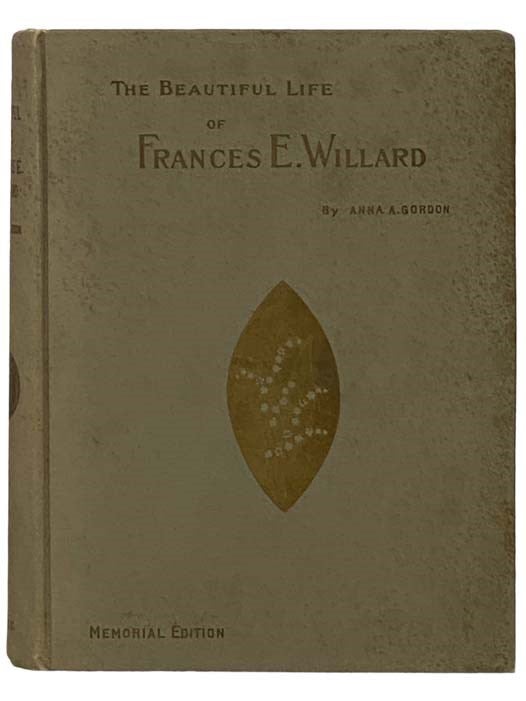
The Beautiful Life of Frances E. Willard: A Memorial Volume, with Character Sketches and Memorial Tributes by the General Officers of the World's and the National W.C.T.U., English Leaders, Dr. Edward Everette Hale, Etc.
Chicago, Illinois: Woman's Temperance Publishing Association, 1898. Hard Cover. Very Good / No Jacket. Item #2331334
Front board soiled, edges lightly foxed, owner bookplate on front endpaper, photographic portrait of Willard laid in.
416 pp. A memorial biography of an important member of the women's suffrage movement. "Frances Elizabeth Caroline Willard (September 28, 1839 – February 17, 1898) was an American educator, temperance reformer, and women's suffragist. In 1871 she became president of Evanston College for Ladies, which merged with Northwestern University in 1873, at which time she became the first Dean of Women of the Women's College. However that position was to be short-lived due to her resignation in 1874 after confrontations with the University President, Charles Henry Fowler, over her governance of the Women's College. After her resignation, Willard focused her energies on a new career, travelling the American East Coast participating in the woman's temperance movement. Her tireless efforts for women's suffrage and prohibition included a fifty-day speaking tour in 1874, an average of 30,000 miles of travel a year, and an average of four hundred lectures a year for a ten year period, mostly with her longtime companion Anna Adams Gordon. In 1874 she participated in the creation of the Woman's Christian Temperance Union (WCTU) where she was elected the first corresponding secretary. Willard was elected president of the United States Woman's Christian Temperance Union in 1879, a position which she held for the remainder of her life. She created the Formed Worldwide WCTU in 1883, and was elected its president in 1888. As president of the WCTU, the crux of Willard's argument for female suffrage was based on the platform of “Home Protection,” which she described as 'the movement...the object of which is to secure for all women above the age of twenty-one years the ballot as one means for the protection of their homes from the devastation caused by the legalized traffic in strong drink.' The “Home Protection” argument was used to garner the support of the “average woman,” who was told to be suspicious of female suffragists by the patriarchal press, religious authorities, and society. The desire for “home protection” gave the average woman a societally appropriate avenue to seek out enfranchisement. Willard insisted that women must forgo the notion that they were the “weaker” sex and that dependence was their nature and must join the movement to improve society, stating “Politics is the place for woman.” The famous portrait, American Woman and her Political Peers, commissioned by Henrietta Briggs-Wall in 1893, featured Frances Willard at the center, surrounded by a convict, American Indian, lunatic, and an idiot. This image succinctly portrayed the argument for female enfranchisement; without the right to vote, the educated, respectable woman was equated with the other outcasts of society to whom the franchise was denied. Her influence was instrumental in the passage of the Eighteenth (Prohibition) and Nineteenth (Women Suffrage) Amendments to the United States Constitution. She founded the magazine The Union Signal, and was its editor from 1892 through 1898. She wrote Woman and Temperance, Nineteen Beautiful Years, A Great Mother, Glimpses of Fifty Years: The Autobiography of an American Woman (1889), and the popular bestseller, A Wheel within a Wheel: How I Learned to Ride the Bicycle (1895), as well as large number of magazine articles. Indeed, Willard's promotion of bicycling to her "White Ribbon Army" has been recognized as an overt attempt to domesticate the bicycle and bicycling. Willard was the first woman represented among the illustrious company of America's greatest leaders in Statuary Hall in the United States Capitol. She was national president of Alpha Phi in 1887, and the first dean of women at Northwestern University. In her later years, Willard became a committed socialist. She died of influenza at the Empire Hotel in New York City while preparing to set sail for a visit to England and bequeathed her Evanston, IL home to the WCTU and in 1965 it was elevated to the status of National Landmark, the Frances Willard House."
Price: $25.00
